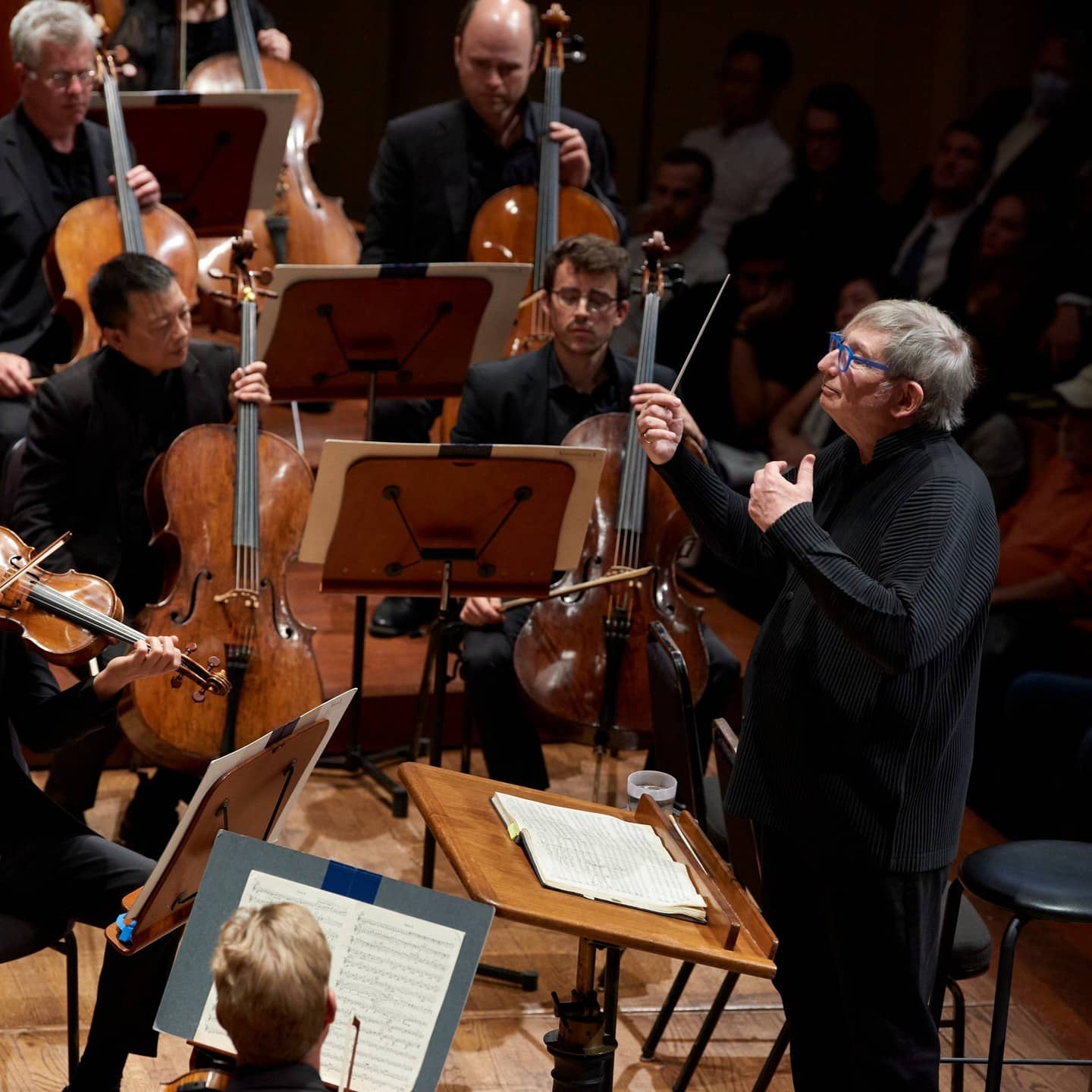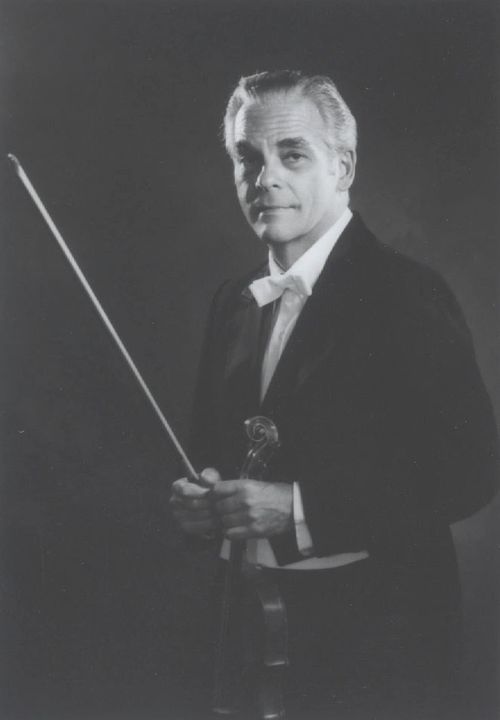The weakened state of a great conductor
OrchestrasTwo chunks from Joshua Kosman’s sombre review* of Michael Tilson Thomas conducting the San Francisco Symphony on Thursday night.
In his first concert as music director of the San Francisco Symphony, in September 1995, Michael Tilson Thomas led the orchestra in a dynamic, revelatory performance of Beethoven’s Ninth Symphony. It was an unforgettable experience, one that established the pattern for the 25 years of musical adventure that followed….
Thursday’s concert, though, was an acknowledgment that anyone wishing to witness Thomas in action one more time would be well advised to do so now. Retired orchestra members and notables of the classical music industry flocked to Davies like pilgrims to pay their respects, and the hall was as full as it’s been in months.
The standing ovation that greeted Thomas’ first appearance on stage was long and heartfelt. The one that followed the conclusion of the “Ode to Joy” finale some 80 minutes later was even more so. (“Shango Memory,” a 1995 work by the late Berkeley composer Olly Wilson, was originally scheduled to fill out the program, but was dropped to allow Thomas to focus on Beethoven.)
In the evening’s wittiest and most loving homage, members of the orchestra took their final bows in blue, round-rimmed glasses — a nod to the sartorial trademark that Thomas has made his own.
There was no mistaking the evidence of Thomas’ weakened state. He approached the podium haltingly, shepherded by his protégé Teddy Abrams, a Bay Area native who is now the music director of the Louisville Orchestra. He conducted without his familiar physical energy.
At one point, before the third movement, he seemed to have lost his bearings, waiting for principal violist Jonathan Vinocour to orient him on the page of the score.
But as soon as the playing began, the old mastery reasserted itself….
Read on here (if you’re in the US).
Content from the San Francisco Chronicle is not available in Europe.






Am I the only one that finds the negative tone of the click bait headline unnecessary?
No.
No you are not alone. N.L. is a drama addict.
It reflects the content of the review, so in that sense, it’s fully appropriate.
That said, we’re not getting it all here. It seems self-defeating for the Chronicle to restrict its readership outside the U.S.
The only word in this headline that is “unnecessary” or inappropriate is the penultimate one.
Peace and love.
Again – when you’re too old. STOP. Teach, guide, write, reflect but just STOP trying to perform. It’s ungratifying and embarassing. Pollini is another.
Brendel did it right.
That wasn’t what happened here. MTT isn’t very old by conductor standards but he is seriously ill.
This was clearly a farewell performance that was deeply meaningful to the orchestra and audience alike. The hall sold out, there were endless standing ovations before and after, even the mayor was there. Everyone was GRATEFUL he was able to do it. And it was still a pretty good performance too.
MTT is not old; he is in the later stages of Brain Cancer.
Not later. Trust me. I know the disease.
You do know he’s not old, he’s just very sick with cancer?
Del boy-MTT is dying, not looking for a next career. Don’t compare him to Pollini etc.
Because Pollini is looking for a next career, right? I wonder how much all those people so ready to make life decisions for others would love to have others make life decisions for them.
Change “old” to “sick” and/or “weak” and then I would agree with you.
Having Brain Cancer is the absolute pits. It would be no mean feat for MTT to get himself in front of an orchestra these days. I’m pleased that audiences went along to support the ailing maestro.
Glioblastoma is merciless, regardless of age. I dunno, paying your respects to a fading maestro is worthwhile, I suppose, even if the patient will not remember the event.
Many years ago I saw a feeble Yehudi Menuhin struggle through the Beethoven concerto with the Cleveland Orchestra. Not the way I wanted to remember him.
Saw his last visit to our megalopolis early this year, a haunting and luminous night of Messaien and Debussy. Forever young, Cher MTT.
I wonder if the concert(s) will be released as an album?
He is scheduled to conduct six concerts in January and three in February with the San Francisco Symphony. We look forward to this.
So far, he hasn´t cancelled his scheduled performances with the National Symphony, Toronto Symphony and the Chicago Symphony in November and December…..Let´s pray!!!!!!
F— cancer.
MTT has not been ostentatiously demonstrative for a while, lets the music and the orchestra speak. His community and orchestra don’t need scenery-chewing.
Yesterday’s concert was probably MTT’s last. How wonderful that he is able to go out surrounded by celebration and affection, in his home city.
He’s conducting Chicago in a couple weeks. We’ll see how it goes. Maybe his doctors are doing good work?
What makes you say that?
Do you know something we don’t?
He has a November engagement with the National Symphony in Washington in November. Amazing that he is able to continue to tour. More power to him.
Let’s put sympathy aside and be objective here: “Great conductor” is an exaggeration. At his best, he was competent. His talent for mimicry far exceeded his musicianship. The top 5 American orchestras never made him their music director – and that is a statement in itself.
But the LSO did. One of the Worlds great orchestras.
The LSO didn’t give MTT the top post, and the appointment was contingent on Bernstein agreeing to come along for the ride, and Sony agreeing to make recordings with him.
Utter nonsense.
That can be argued pro and con, but even great ones make mistakes sometimes.
He created an orchestra on the level of the 5 US top orchestras(hopelessly outdated list,anyway…).SFSO is as good as any of those 5( there are at least big 10 now)…And better than any of those 5 except for Boston and Cleveland…Thanks to him.
If that were even remotely true, the most important orchestras would have grabbed him – They didn’t.
That is ridiculous: MTT did not “create” that orchestra – SFS was very good long before him when it was led by much better musicians such as for example Ozawa and Blomstedt. Fortunately, it is now again being led by a very fine conductor.
First, Ozawa was a far worse musician than MTT…And in Ozawa´s days the SFS just was on its way to become a very good orchestra,not much more. And Ozawa laid off quite a few substandard players,but not all.And left soon for Boston.Blomsted was(and is superb), he greatly improved the orchestra. But MTT really fine tuned it, hired more than 70 percent of today´s players,expanded the repertoire…And yes,he has a worthy successor now.
MTT tried like hell to get the Boston Symphony MD job (where he was already associate conductor), but he lost out to Ozawa (and then he was quickly elbowed out). He then tried to get the Los Angeles Phil job, but lost it to the younger Esa-Pekka Salonen. Interesting now that Salonen has followed MTT to the SFS.
My longtime extensive experience with and my considerable knowledge of musical accomplishments of both SO and MTT make me fully confident that you are very wrong when comparing their quality as conductors, just like you are badly mistaken when spelling Maestro Blomstedt’s last name. As for SFS, they were already a very fine orchestra by the early 1990s and then managed to more or less remain that way in spite of MTT who may have been the right person for their city and for majority of their audience in late 1990s but certainly stayed there for too long. They now have a good chance to get even better with EPS.
San Francisco since Blomstedt’s days has been the equal of any other U.S. orchestra.
MTT’s resume doesn’t appear to be that of a great conductor. His beginning apprenticeship with the Boston Symphony was brief, and he was terminated after just a few years. His job as Music Director of the Buffalo Philharmonic was about 6 seasons or so, and suddenly ended after he was nabbed in a drug-bust at Kennedy Airport (around 1977 or so). He was then unemployed for about 11 years – despite MD openings at several major American orchestras. Then the LSO engagement came along – although with certain contingencies, as well as a training-orchestra job in Miami. And then finally the MD job in San Francisco. But throughout the past 50 years or so, there were MD openings with Philadelphia Orchestra, NY Philharmonic, Boston Symphony, Cleveland Orchestra, Los Angeles Philharmonic, Pittsburgh Symphony, etc – and MTT was notably overlooked for all these positions. So, in evaluating his stature as a conductor, these facts merit consideration.
I understand your need to not waste an opportunity to correct others. Someone used “great conductor” to describe a guy with brain cancer. But you don’t think he’s great, so you need to give an opinion. “Um ackchyually…”
But what you could’ve said was nothing.
He was a finalist for the BSO but the board didn’t like his personal life.
The BSO never considered him.
Apparently DSDIU is kidding while talking about the same organization that made James Levine their Music Director when so much was widely known about ” ‘his’ personal life “.
Needless to say, MTT paled next to James Levine in terms of talent & ability. And as is well known within the music industry, MTT was known for the same activities that landed Levine in trouble – but MTT wasn’t ratted out like Levine was.
Joshua Kosman’ a great music scholar. I try to read his reviews for almost 40 years. The most knowledgeable and trusted critic.He’s a local treasure.
Mr. Kosman’s review was a concise, credible and compassionate account of what apparently happened on Thursday night. It had me in a defensive crouch as Sunday afternoon’s performance began. Fortunately, things turned out very differently. MTT, standing throughout, for whatever that’s worth, led a very fine performance, setting well-judged tempos and giving good cues. Nothing distracted from the music. That his beat didn’t vary with anticipated volume just showed that the orchestra was already in a position to excel. Maestro Panula would have given him high marks. That we had an unusually well-matched and musicianly solo quartet, which reveled in the joyous moment, was a terrific bonus. In every way that matters, if this was goodbye, it couldn’t possibly have been a better one.